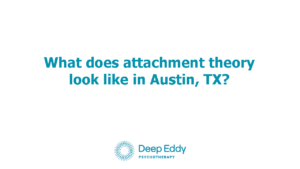What Is Attachment Theory & How Early Experiences Develop Our Expectations
Attachment theory is the study of how our early experiences with our parents frame and develop our expectations of other people and how we adapt based on those expectations.
As an example, if our parents are really there for us and there for our feelings, then we really learn to trust that people will be there to support us. We learn that we can have our emotions, we can connect and come close.
If there’s a lot of neglect and your parents are not there, then we may have an adaptation of “I’m just gonna take care of myself” and really pull inward. That then becomes such a habit, that we just carry that along through our life, not even all that aware of it.
Attachment Theory Looks at The Main Types of Adaptations Available
Attachment theory really looks at the main types of adaptations available. That might show up looking like a person being more pulled in and hyper-independent, which might mean being an island, just to give it a simple word.
Sometimes it looks more like clinging and like you’re doing things, even if those things are, “I’d rather be fighting with you then disconnected.” It’s done just to get a reaction, just to get some contact. That would be more like what Stan Tatkin would call a wave.
If it’s something like, “I’m comfortable with contact but I can also be independent,” which is sort of the healthiest option, you can call that an anchor.
I’ll talk to my clients about what the differences are between those, so we can explore what their attachment style is. It definitely helps them understand the relationship they have to their own feelings, and also certainly to other people.
Is there a better style of attachment?
With attachment style, it’s kind of, everybody wants to be an anchor because that’s the securest—what’s called secure attachment style. It means you’re really comfortable with closeness, but you’re also comfortable with distance. That being said, they’re all workable strategies.
There Is No Better or Worse
There’s really no better or worse. Somebody who is an island can have a lovely relationship where they really know how to take care of their partner, and have a lot of success. And same with a wave. So it’s really just kind of knowing who you are, and embracing that, and your partner embracing that. You learn that can heal over time, but it’s almost like accepting ourselves is more likely to heal, versus being frustrated with our partner or ourselves for being the way we are wired.
Is one of the things you teach in therapy self-acceptance?
Yes, absolutely. I say self-compassion or self-acceptance; really sometimes I’ll even say self-love, which is maybe the deepest way of saying it.
Self-Compassion versus Self-Esteem
That brings me to a kind of a side question, but that I think is useful, which is really understanding the difference between self-esteem and self-compassion, because we hear a lot about self-esteem, and it’s a positive thing, but it actually has some positives and some negatives with it, too, like it can make people more arrogant and things like that.
Where self-compassion is one hundred percent positive. And the difference is—this is coming out of the work of Kristin Neff, PhD, who is like the self-compassion guru. She’s a wonderful person to know about—self-esteem is beautiful but it’s still based on judgement. It’s saying I think I’m so smart, or creative, or I like myself because I’m really beautiful or whatever.
Treating Yourself with Kindness
It’s good to know and enjoy our positives, our strengths, but self-compassion is really treating myself just like every other human being deserves to be treated: with kindness. And the nice thing about self-compassion is just in that moment where self-esteem sort of deserts us…you know, when we’ve made a mistake, or we had a failure, we didn’t get the job we wanted or something like that. That’s right when we need something and that’s where self-compassion can really come in and lift us up and put wind in our sails again.
The More Critical We Are of Ourselves, The More Stress It Puts On Us
There’s nothing negative about self-compassion. One thing that I have to coach my clients on sometimes is they think if they’re not hard on themselves, that they’ll lose motivation, they’ll become lazy or something. But really the research says just the exact opposite, that the more we berate ourselves, the more we attack ourselves, become critical of ourselves, the more stress it puts on us. It’s like being under attack all the time, which raises our cortisol levels. That is very stressful for our brain and makes our brain not function as well, and it kinda shuts us down and makes us anxious. It makes it less likely to be successful and motivated.
You Can Give Up The Critical Inner Voice
Sometimes that’s a helpful piece to understand because it reminds you that you can really give up that critical inner voice, that thing that is there making you do the right thing, but really actually just messing with you.
Compassion Helps Motivate
Compassion actually helps motivate just like you would with a child, you love the child and then you positively reinforce them, “You can do it, I believe in you,” and it’s much more encouraging.
Starting Therapy in Austin, TX
We would love to invite you to make a complimentary call to discuss some of your options and determine whether Deep Eddy Psychotherapy in Austin, TX is the right fit for you and your situation. Please contact us using the links below or in the sidebar and share this post or video if you found it to be valuable. Together we can create a world of well-being and joy.

